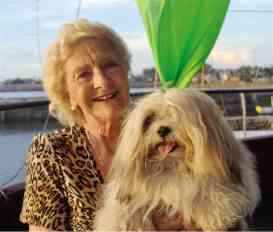For UK filmmaker, PH is in the heart
BACOLOD CITY, Philippines—Puti ang balat, pero Pinoy ang puso (My skin is white but my heart is Filipino).”
The message is written on the shirt that British television documentary filmmaker Hazel Andrea-Stuart often wears.
And that’s exactly what she is.
Hazel has dedicated her life to making documentaries that feature the Philippines’ wonders, as well as its culture and exceptional people.
On Sept. 19, she launched her 75th film on the Philippines, “The Christmas Spirit 24/7,” at L’Fisher Hotel in Bacolod City. The film is about the many unsung heroes in the Philippines who demonstrate the true Christmas spirit of giving not just at Christmastime.
With music provided by Jose Mari Chan and his family, it features the generous hearts of people like American pastor Joseph Rosmarino, who runs Calvary Home with his wife, Billie, in Barangay Handumanan in Bacolod. The home cares for more than 150 children because, according to Rosmarino, “no child is ever turned away.”
American pastor Todd Caplinger and his wife, Catherine, run a mission and church in Salvador Benedicto town, Negros Occidental province, which help indigents through livelihood projects.
Also in the film are Chan’s sister, Maria Theresa, and her son, Micco, who are behind One Meal Program, a nonprofit organization that provides underprivileged schoolchildren with such basic needs as repairing classrooms, constructing school buildings and distributing school supplies.
The organization also conducts feeding programs for kindergarten and Grade 1 pupils.
Hazel dedicated her latest film to her late husband, American David Stuart—the reason she came to the Philippines.
David was the son of Dr. Harland Stuart, the first president of Central Philippine University (CPU) in Iloilo City from 1922 until 1938, and Guendolen Reed. He grew up in Iloilo but went back to the United States when he was 14 after his mother got sick.
Hazel was born in Kent, England, where she was part of the elite BBC singers. She later left the group for a solo career.
Her performances—a fusion of her singing, poetry and photos of nature and places projected on a screen behind her—brought her to Lincoln Center in New York, National Geographic in Washington and London’s prestigious Royal Festival Hall.
“I sang a wide range of music from opera to folk song and songs from [musical] shows,” she said.
Hazel met David in 1983 when he and his wife, Marge, went to London upon the insistence of Hazel’s American friend, Betty Weilert. At that time, she was a professor at London College of Music.
“[David and Marge] took me to lunch. The first time I saw him, it was love at first sight, but he was sitting next to his charming wife, Marge,” said Hazel, whose fiancé just died at that time.
The next year, Hazel was on a concert tour in the United States when she learned that Marge had died of a heart attack. She felt sad for David and his three daughters.
Dinner date
Three weeks later, Weilert invited both Hazel and David to dinner. “I felt the same way as before but sat as far as possible from him and did not flutter my eyelashes,” Hazel said.
A few weeks later, Weilbert called her up from the United States to tell her David was going to England. Sixty-seven hours after his arrival in England, David proposed to her on the top step of St. Paul’s Cathedral. He even apologized for being so slow.
Hazel can still remember what David had told her: “When I retire as a project manager for Kodak, I shall buy a motor home and we will go around doing your concerts.”
They got married on July 4, 1985, in brilliant sunshine in Yorkshire, England, and the reception was in the house of Oliver Cromwell, a famous English military and political leader in the 1500s. They had their honeymoon in Jamaica.
“We then moved back to a new house in Rochester, New York, so David could continue until retirement at Kodak,” she said.
David fulfilled his promise. He bought a beautiful motor home and they went all over the United States where she performed more than 100 concerts a year.
Back to Iloilo
David, however, didn’t forget his childhood and wanted to go back to Iloilo.
“As a British videographer, I was thrilled at the thought of seeing the country where my husband grew up. We came for a visit in 1997. I dived and filmed the coral reefs in Tubbataha [Reefs] and in other parts of the country, and fell in love with the people,” Hazel said.
They were later invited by CPU to work as consultants to its Media Center. In 1998, they returned for good.
The couple left CPU in 2002 and started making films about the country.
When David died in 2008 in Iloilo, Hazel moved to Bacolod where she stayed for six years before returning to Iloilo. She kept on making documentaries about the Philippines using her pension because, she said, her love of the Philippines continued to grow.
Her documentaries were shown on Living Asia and some local channels in the Visayas and in the United States.
Five of her films won the International Communicators Awards in the United States.
“I have produced over 75 films on the Philippines, because I live here, and because it is so beautiful. It is a way of bringing publicity to the Philippines, and several times people have thanked me in the street and told me I am doing more for the Philippines than for Filipinos. This means so much to me,” she said.
